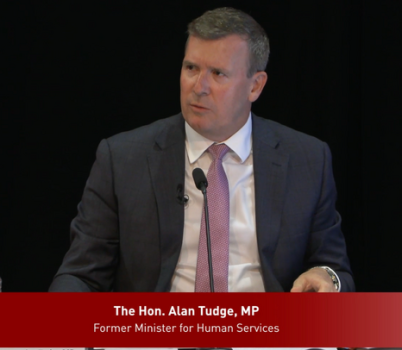It’s up to bureaucrats to deal with problems, such as the legality of government schemes, rather than alarming ministers, according to former Human Services Minister Alan Tudge.

“A secretary’s not going to just come up to you and say, ‘hey we’ve got this big problem which happens to be in the department, I haven’t even thought about it, I’m just raising it with you to cause you anxiety’,” Mr Tudge told the Robodebt Royal Commission on Wednesday.
“When you reach the senior levels of public service in Canberra, you’re very senior, you’re very experienced, and very good. And if they thought there was an issue they would have got that checked.”
Mr Tudge told the commission that “with the chief legal officers of the department and the secretary not raising anything with me (about the lawfulness of Robodebt), which she had a legal obligation to do, it simply wasn’t in my mind to enquire about that.”
Warning from eminent legal expert
Mr Tudge was questioned about his knowledge of a presentation by a leading silk at an administrative law conference in June 2017, one year into the operation of Robodebt, which warned the debt collection scheme might be unlawful.
In his keynote at the conference, Peter Hanks KC – who later made applications in the Federal Court which led to a $1.2 billion class action against the government – raised serious question about the legality of the scheme, Senior Counsel assisting Justin Greggery put to Mr Tudge.
Eight lawyers from the Department of Human Services attended the conference, and reports were sent to Mr Tudge’s then Chief Counsel Annette Musolino and secretary Kathryn Campbell.
“Surely in those circumstances you would accept … that steps ought to have been taken by the secretary and chief counsel to assure themselves of the legality of the scheme?” Mr Greggery said.
My expectation is it would make them inevitably contemplate what the advice was that was given, and reassure themselves that what they were doing was lawful.
Former DHS minister Alan Tudge
“My expectation is it would make them inevitably contemplate what the advice was that was given, and reassure themselves that what they were doing was lawful,” Mr Tudge said.
He said if there were concerns it should have been taken up with lawyers in the Department of Social Services (DSS), which was responsible for issues of legality because it oversaw policy around the scheme.
“If having contemplated it, raised it with DSS, asked DSS to assure themselves as policy owners, then I would have expected it to be raised,” Mr Tudge said.
“If they formed the view that there is something in this, then it should have been raised with (former minister Christian) Porter as the DSS minister, and copied in to me as the implementing minister.”
‘Not a ministerial failing’
Mr Greggery asked: “If those steps weren’t taken … that shortcoming is obviously a failing within your department for which you are responsible as the minister?”
Mr Tudge replied: “I don’t know that you can say that. I wasn’t even aware of the conference.”
“You do understand the concept of ministerial responsibility?”Mr Greggery said.
Mr Tudge said he “accepted deeply” the Westminster concept of ministerial responsibility.
“I don’t accept the proposition that I was responsible for an individual not making a choice to raise a matter with her counterpart in a different department,” he said.
The Robodebt Royal Commission is inquiring into the fairness, legality and policy considerations of the failed debt recovery scheme, which unlawfully claimed almost $2 billion from 450,000 people.
The latest round of hearings will run until February 3 in Brisbane.
Commissioner Catherine Holmes SC will hand down her final report by April 2023.





Sounds like…I will take the money…but not the responsibility for poor decisions. There are actual suicides involved here from a nasty scheme.
Surely it is within the bounds of Ministerial Responsibility for the Minister to ensure that a report has been provided with a responsible positive legal opinion about a scheme before such scheme is implemented?